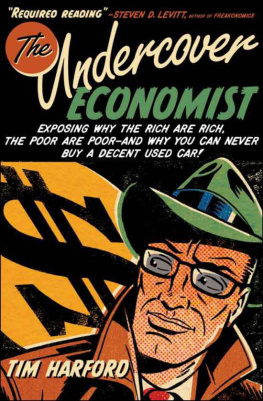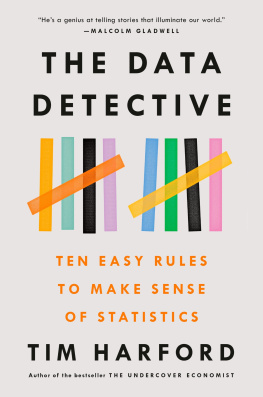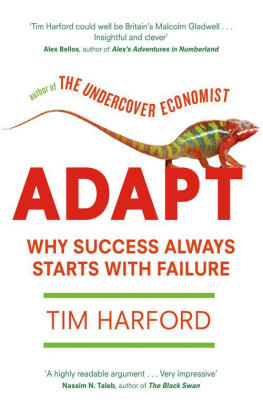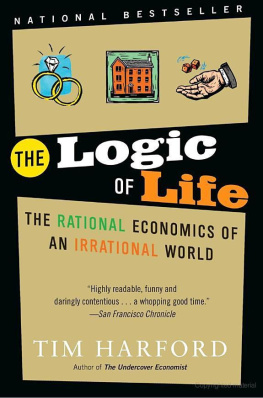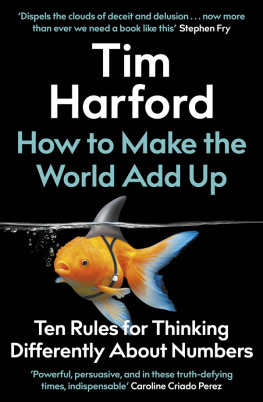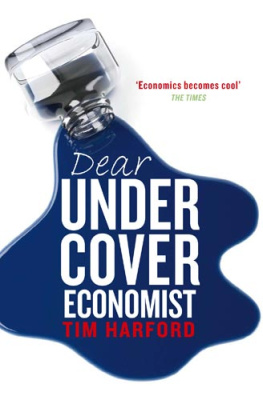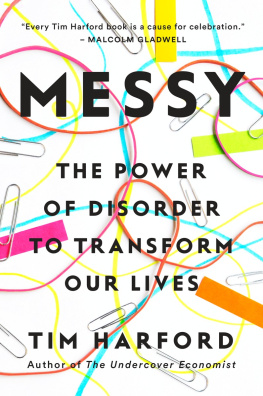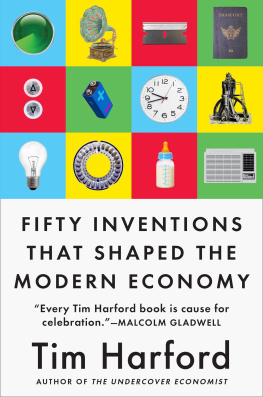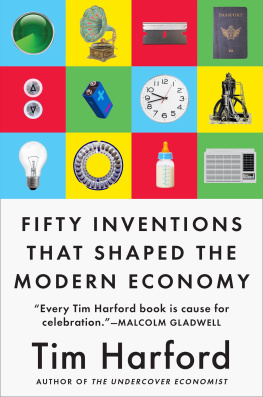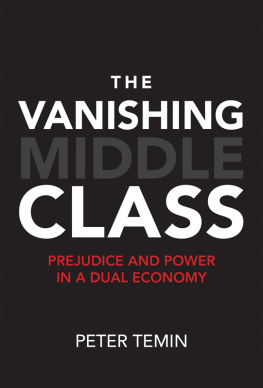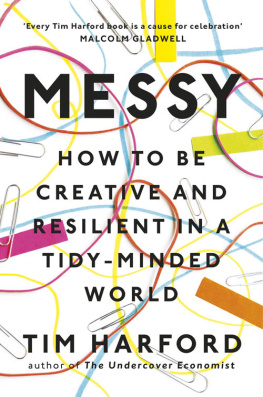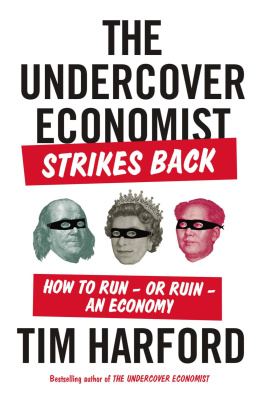THE UNDERCOVER ECONOMIST
THE UNDERCOVER ECONOMIST
Exposing Why The Rich Are Rich,
The Poor Are Poor
And Why You Can Never Buy
A Decent Used Car!
Tim Harford


Oxford University Press, Inc., publishes works that
further Oxford Universitys objective of excellence
in research, scholarship, and education.
Oxford New York
Auckland Cape Town Dar es Salaam Hong Kong Karachi
Kuala Lumpur Madrid Melbourne Mexico City Nairobi
New Delhi Shanghai Taipei Toronto
With offices in Argentina Austria Brazil Chile Czech Republic France Greece
Guatemala Hungary Italy Japan Poland Portugal Singapore
South Korea Switzerland Thailand Turkey Ukraine Vietnam
Copyright 2006 by Tim Harford
Published by Oxford University Press, Inc.
198 Madison Avenue, New York, New York, 10016
www.oup.com
Oxford is a registered trademark of Oxford University Press
All rights reserved. No part of this publication may be reproduced,
stored in a retrieval system, or transmitted, in any form or by any means,
electronic, mechanical, photocopying, recording, or otherwise,
without the prior permission of Oxford University Press.
Library of Congress Cataloging-in-Publication Data
Harford, Tim, 1973
The undercover economist / Tim Harford.
p. cm.
ISBN-13: 978-0-19-518977-3
ISBN-10: 0-19-518977-9
1. Economic history, 1990
2. Economics.
3. Consumer education.
I. Title.
HC59.15.H35 2005 330.90511dc22
2005010297
135798642
Printed in the United States of America
on acid-free paper
To Deborah Harford, Fran Monks, and Stella Harfordfamily... past, present, and future.
Acknowledgments
Peter Sinclair got me into economics; Tony Courakis, Simon Cowan, Stan Fischer, Bob Garhart, Paul Klemperer, Brendan McElroy, Elinor Ostrom, Hyun Shin, Bill Sjostrom, and many others helped me along the way. I am grateful to them all.
At Shell, Ged Davis let me work part-time while I produced the first draft of the book. I was flattered by his reluctance and grateful for his support. Other colleagues at Shell were inspirational, especially Betty-Sue Flowers, Anupam Khanna, Cho Khong, Michael Klein, Doug McKay, and John Robinson.
At the Financial Times, Pilita Clark, Andy Davis, Chris Giles, Andrew Gowers, John Kay, John Willman, and Martin Wolf gave me opportunities and then made sure I didnt waste them.
At the World Bank, Michael Klein and Suzanne Smith are wonderful colleagues and every day with them is an education.
David Bodanis, Felicity Bryan, Penny Dablin, Moore Flannery, Juri Gabriel, Mark Henstridge, Diana Jackson, Oliver Johnson, John Kay, Cho Khong, Paul Klemperer, Stephen McGroarty, Doug McKay, Fran Monks, Dave Morris, Rafael Ramirez, Jillian Reilly, John Robinson, Tim Savin, Martin Wolf, and Andrew Wright improved the book with their comments.
Sally Holloway, my agent, has been superb. Tim Bartlett and Kate Hamill at Oxford University Press infuriated me with their precision and insightI have been very lucky to work with them.
Most importantly, emotional support came from Diana Jackson, my wife Fran Monks, Uncle Dave Morris, and Jillian Reilly. Above all I have to thank Andrew Wright, a genius, without whom the book could never have been finished, and David Bodanis, an inspiration, without whom it would never have been started.
Contents
ONE
Who Pays for Your Coffee?
TWO
What Supermarkets Dont Want You to Know
THREE
Perfect Markets and the World of Truth
FOUR
Crosstown Traffic
FIVE
The Inside Story
SIX
Rational Insanity
SEVEN
The Men Who Knew the Value of Nothing
EIGHT
Why Poor Countries Are Poor
NINE
Beer, Fries, and Globalization
TEN
How China Grew Rich
THE UNDERCOVER ECONOMIST
Introduction
I would like to thank you for buying this book, but if youre anything like me you havent bought it at all. Instead, youve carried it into the bookstore caf and even now are sipping a cappuccino in comfort while you decide whether its worth your money.
This is a book about how economists view the world. In fact, there might be an economist sitting near you right now. You might not spot hima normal person looking at an economist wouldnt notice anything remarkable. But normal people look remarkable in the eyes of economists. What is the economist seeing? What could he tell you, if you cared to ask? And why should you care?
You may think youre enjoying a frothy cappuccino, but the economist sees youand the cappuccinoas players in an intricate game of signals and negotiations, contests of strength and battles of wits. The game is for high stakes: some of the people who worked to get that coffee in front of you made a lot of money, some of them made very little, and some of them are after the money in your pocket right now. The economist can tell you who will get what, how, and why. My hope is that by the time you finish this book, youll be able to see the same things. But please buy it first, before the store manager throws you out.
Your coffee is intriguing to the economist for another reason: he doesnt know how to make a cappuccino, and he knows thatnobody else does either. Who, after all, could boast of being able to grow, pick, roast, and blend coffee, raise and milk cows, roll steel and mold plastics and assemble them into an espresso machine, and, finally, shape ceramics into a cute mug? Your cappuccino reflects the outcome of a system of staggering complexity. There isnt a single person in the world who could produce what it takes to make a cappuccino.
The economist knows that the cappuccino is the product of an incredible team effort. Not only that, there is nobody in charge of the team. Economist Paul Seabright reminds us of the pleas of the Soviet official trying to comprehend the western system: Tell me... who is in charge of the supply of bread to the population of London? The question is comical, but the answernobody is dizzying.
When the economist drags his attention away from your coffee and looks around the bookstore, the organizational challenges are even greater. The complexity of the system that made the store possible defies easy description: think of the accumulated centuries of design and development, from the paper upon which the books are printed to the spotlights that illuminate the shelves to the software that keeps track of the stock, not to mention the everyday miracles of organization through which the books are printed, bound, stored, delivered, stacked, and sold.
The system works remarkably well. When you bought this bookyou have bought this book by now, havent you?you probably did so without having to give instructions to the bookstore to order it for you. Perhaps you did not even know when you left your home this morning that you were going to buy it. Yet by some magic, dozens of people took the actions necessary to fulfill your unpredictable desires: me, my editors, marketers, proofreaders, printers, paper manufacturers, ink suppliers, and many others. The economist can explain how such a system works, how companies will try to exploit it, and what you as a customer can do to fight back.
Now the Undercover Economist is gazing out of the window at the traffic jam outside. To some people, the jam is merely andirritating fact of life. To the economist, there is a story to tell about the contrast between the chaos of the traffic and the smooth running of the bookshop. We can learn something from the bookstore that will help us avoid traffic jams.
Next page
